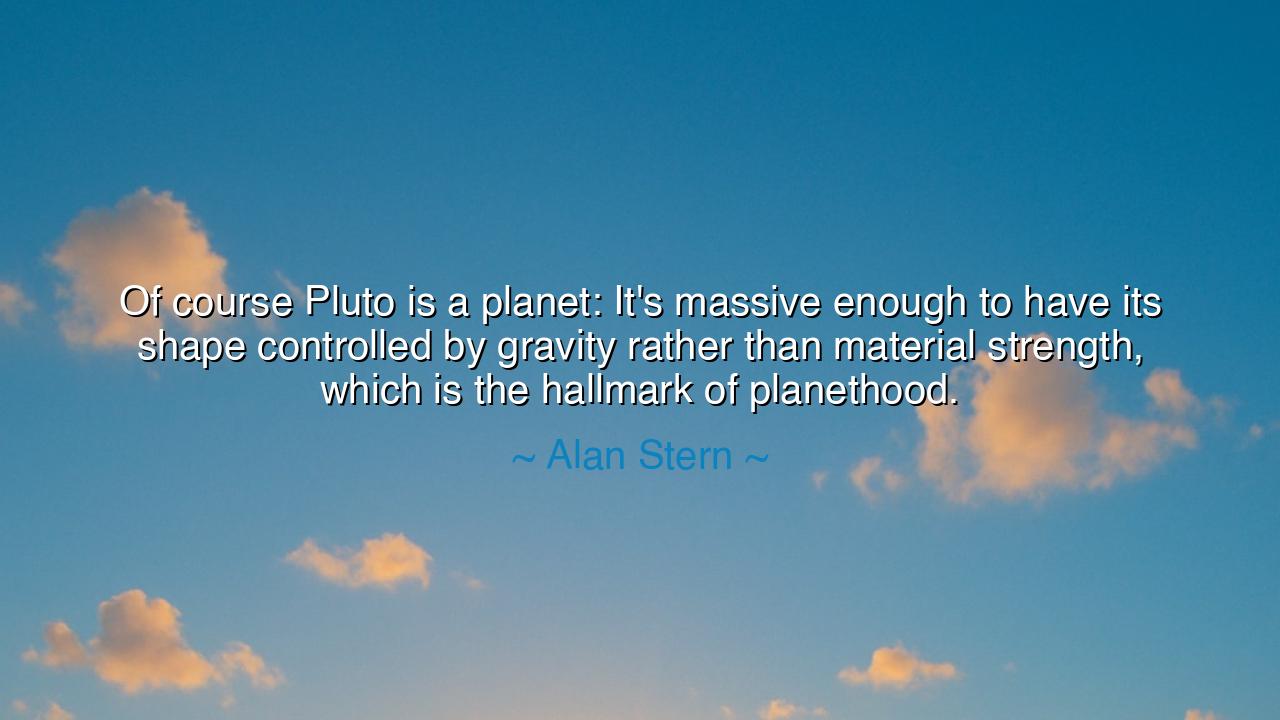
Of course Pluto is a planet: It's massive enough to have its
Of course Pluto is a planet: It's massive enough to have its shape controlled by gravity rather than material strength, which is the hallmark of planethood.






Alan Stern, the great champion of the outer worlds, once proclaimed: “Of course Pluto is a planet: It’s massive enough to have its shape controlled by gravity rather than material strength, which is the hallmark of planethood.” In this declaration, Stern speaks not only as a scientist but as a guardian of truth against forgetfulness and dismissal. His words remind us that nature has laws deeper than committees and votes, and that gravity, eternal and impartial, shapes destiny far more than opinion.
The origin of this saying rests in the controversy of 2006, when the International Astronomical Union stripped Pluto of its long-held title of planet. To many, Pluto became a “dwarf,” diminished in repute, exiled to the margins of textbooks. Yet Stern, who led NASA’s New Horizons mission to Pluto, stood against this decree. For he knew that Pluto bore the very essence of a world: not merely a wandering rock, but a body molded by its own gravity, rounded and sovereign, carrying mountains, valleys, and skies within its domain. He proclaimed this truth with the zeal of one who had seen Pluto’s face up close, bathed in sunlight at the edge of creation.
When Stern speaks of material strength versus gravity, he evokes a profound metaphor. A small stone holds its jagged shape, for its matter is stronger than the pull of its own gravity. But a great world cannot resist the embrace of the cosmos. It is drawn into roundness, sculpted by the unseen hand of the universe. So too with people: the small spirit clings to roughness, to pride, to broken form. But the great soul, massive with vision and purpose, is pulled into harmony by forces greater than itself. It is not mere strength of material, but surrender to the law of higher order, that reveals greatness.
History, too, teaches this. Consider Galileo, who, when the powers of his age decreed that Earth was fixed, stood firm upon observation and reason. He, like Stern, declared: “And yet it moves.” So too, Stern cries: “And yet it is a planet.” The courage to defend truth against authority, to honor reality over labels, is the courage that carries science forward. For definitions may waver, but nature remains what it is. Pluto’s gravity will not be silenced by votes; its mountains of ice and plains of nitrogen whisper, unbent: “I am a world.”
In Stern’s words also lies a defense of dignity. For if a planet may be cast down by decree, so too may people. How often have voices been dismissed, identities diminished, or achievements overlooked by those who sit in councils of judgment? Yet, as with Pluto, true worth does not rest in labels. True worth rests in the undeniable force of what one is. To be shaped by gravity, to hold one’s form against the void—that is greatness, whether in a world of rock and ice, or in a human life of vision and struggle.
The lesson is clear: do not let others define your essence. Like Pluto, your worth is not diminished by names imposed from without. What matters is the force within you—the gravity of your character, the weight of your truth, the harmony of your being shaped not by brittle surface but by inner law. Let committees of opinion speak what they will; your reality will outlast their words.
So let Alan Stern’s declaration endure as teaching for all generations: honor what is real, not what is decreed. Recognize planethood not only in worlds of ice and stone, but in the lives of those around you. For the true hallmark of greatness is not brittle material strength, but the unseen gravity that shapes us into wholeness, into harmony, into something greater than ourselves. And when you find that force within, stand as Pluto stands—round, unbroken, and eternal at the edge of the heavens.






AAdministratorAdministrator
Welcome, honored guests. Please leave a comment, we will respond soon